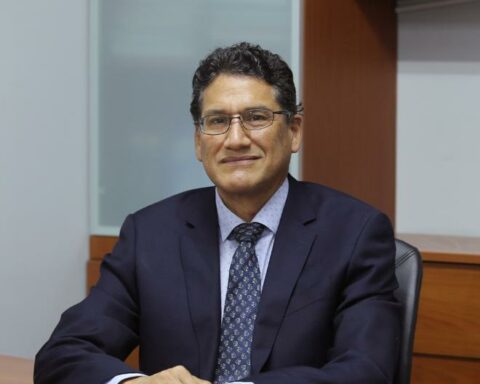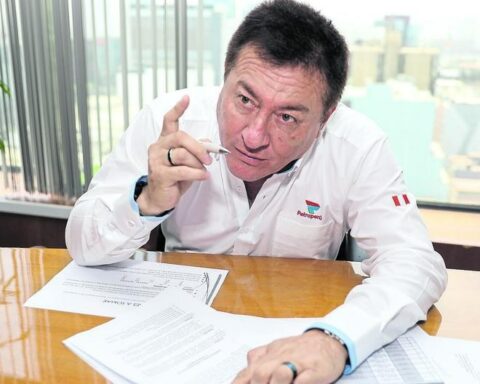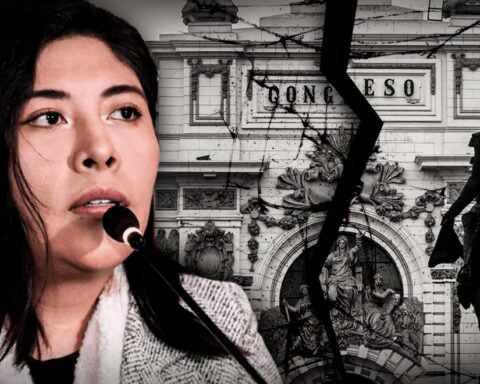The former Minister of Health, Óscar Ugarte, considers that the current government falls into contradictions on health measures to prevent the spread of COVID-19, in the face of the fourth wave due to the increase in infections. This after the Minister of Health, Jorge López, and the President of the Council of Ministers, Aníbal Torres, gave different messages about the mandatory use of masks.
López had said that masks were once again mandatory in open spaces and Torres later pointed out that it was a recommendation. Recently, the former also said that the suspension of massive social events is being evaluated to prevent the spread of the virus, and the PCM ruled out said measure yesterday.
“This generates confusion in the population and finally distrust, in the end nobody believes in anything and they end up doing what their good understanding dictates, that is terrible”, Ugarte pointed out to this medium.
As for the use of the maskthe former Minister of Health said that if required and therefore it was hasty to say ‘in open spaces do not wear a mask‘, as he remarked “the problem is not the open space alone”, but the risk of movement of people.
“If I am in an open space and there is no greater circulation of people, it is logical, nobody wears a mask being alone in a park. The risk is the movement of people”, he emphasized.
To do? Ugarte explained that in open spaces with a large concentration of people “you have to wear a mask”. For example, in stadiums, busy shopping malls, at concerts, processions, political rallies.
Targeted measures
Ugarte also recalled that in the previous government, the different areas of the country were rated according to the real risk that could exist, since “Peru is very diverse and heterogeneous, and giving a single standard for the entire country does not make sense”.
“Every fifteen days a risk rating was made of the more than 190 provinces that Peru has and they were classified as moderate risk, high risk, very high and extreme and depending on that there was a curfew or not and certain capacity in meeting centers. , etc”, he indicated.
For this, he pointed out, it is necessary to have technical teams from the Minsa that permanently analyze and evaluate the country’s jurisdictions.
About massive events
Ugarte also considered that the current Minister of Health gave a contradictory message after announcing that there will be no military parade for National Holidays to avoid further coronavirus infections.
“If that is the logic, then what massive events can be held, concerts? Is it for economic reasons, investments already made? That is, other elements are introduced”, he commented, while considering that the Minsa has to have a very clear position, taking into account different risks and applying measures in each case.
“For example, discos are a center where viruses can expand and spread and as a precaution I think they should not be authorized, but there can be public events in open spaces, with distancing and corresponding sanitary measures, it must be analyzed according to the risk”, he insisted.
In his reading, the work of the Ministry of Health is being eliminated, which is to analyze the different circumstances and take measures based on that, and “the easiest path is being chosen, general measures for all, which are not applicable.”
Is direct purchase of vaccines viable?
Another measure arranged by the Executive is to authorize regional and local governments and private companies to directly import vaccines and medicines against the coronavirus, according to the regulations of Law No. 31225 published this week in “El Peruano”, in order to ensure your timely access.
In this regard, Óscar Ugarte pointed out that he does not see this measure as necessary when we are not facing a dose shortage problem in the country.
In the first place, the former Minister of Health recalled that in the previous government of former President Francisco Sagasti, of which he was a part, there was an interest from private parties to acquire vaccines.
“And we told them that it is not prohibited, that if they wanted they could do it, the problem was that none of the vaccine producers worldwide sold to the private sector, but rather to the States”, he mentioned.
Regarding the current provision, he notes that the Minsa itself puts some locks on the norm, “which makes me think how useful this regulation could be”.
Ugarte affirms that currently the problem in the country “It is not the lack of vaccines”, because there are excess doses purchased by the State, therefore anyone who wants to be vaccinated (can do so). “Vaccination centers are empty“, I note.
Along these lines, he wondered what could be the interest of the private sector in importing the doses when they are available and free of charge for the entire population.
And in the case of regional and local governments as well, he added. “In Reunis you can see the amount of population that remains to be vaccinated in regions, but not because there is a lack of vaccines, they have too many, and the problem is that they are expiring”, he warned.
In addition, he considered that there are three points of the regulation that could be a brake on importation:
1. That private companies will be responsible for compensating people in cases of severe Esavi (Event Supposedly Attributed to Vaccination or Immunization), according to article 10 of the regulation. This is currently assumed by the State.
2. That the importation does not allow the commercialization of the product under any modality, that is, the company will not be able to sell or charge for the application of the doses. “So what is the incentive that a private company can have to import and what is the incentive for the regions and municipalities to do so if they have leftover vaccines delivered by the Minsa??”, he asked himself.
3. He also mentioned that the regulation provides that the company must guarantee free vaccination for its staff. “That could be the incentive, ‘I’m going to import to vaccinate my workers’”. But he insisted that they can also go to the vaccination clinics and do it for free, or request that the Minsa brigades visit them.
Lastly, he noted that regional and local governments they do not currently have in their budget for 2022, an additional item for the importation of vaccines.
RECOMMENDED VIDEO
:quality(75)/cdn.jwplayer.com/v2/media/QzAmeHAW/poster.jpg)

